It’s been “a” year
March 15th, 2021 By Pastor Craig Pederson
By Pastor Craig Pederson
I’m an avid fan of “The Late Show with Stephen Colbert.” I find Colbert to be incredibly smart, funny, entertaining, and insightful. The writers who craft the monologues and skits are amazingly creative, and the house band (called “Jon Batiste and Stay Human”) emotes an authentic and joyful New Orleans vibe that richly enhances the show.
Colbert is also a devout Catholic. I appreciate his openness about the importance of his faith, which he communicates not only through jokes and skits but also through the occasional sharing of opinions from his heart.
“After a few weeks of trying various approaches, Colbert finally just acknowledged the inherent strangeness and uncertainty of the new pandemic reality.”
I have really admired Colbert’s approach to pivoting his show during this past pandemic year. Upon going into quarantine lockdown, like other late night talk show hosts, he had to move from the bright lights of a packed theater to the mundane confines of a room in his house.
After a few weeks of trying various approaches while performing monologues to no audience and conducting guest interviews via Zoom, Colbert finally just acknowledged the inherent strangeness and uncertainty of the new pandemic reality. He changed the article before “Late Show” from “The” to “A” – saying that “A Late Show” indicated he really didn’t know what would happen from one day to the next, or what his show would look like from one night to the next. Each show was an attempt to capture some sort of perspective on a reality unlike anything we’ve experienced in our lifetimes.
WE, TOO, HAVE BEEN trying to find perspectives to help us navigate the past year. In our synod office, in congregations, in schools, in workplaces, and in homes, each new day seems to have turned into “a” day without precedent or prescription.
Along the way we have grieved losses, reckoned with injustices as seen through newly opened eyes (at least from a white-privileged point of view), cheered advances in battling the pandemic, and endured an election cycle that threatened the foundations of our democracy. We also wrestled with questions of what the church will look like on the other side of the pandemic even as we have toiled to “be the church” in the midst of it.
“We have wrestled with questions of what the church will look like on the other side of the pandemic.”
As we worked to adapt, learn, and lead on-the-fly, some of the things we tried fizzled while others went remarkably well (whether we planned it that way or not!).
But beyond just outcomes, I believe and trust that we are strengthening our faith practices for the journey ahead. We are practicing new levels of grace, humility, and generosity – with others and with ourselves – that will serve us well as we learn new approaches to ministry from one another regardless of congregation size or location or status.
And we are more open to taking risks for the sake of the gospel. Think of the innovations and adjustments you’ve witnessed in your congregation over the past year. Would they have been possible in “normal” times?
And so it has been “a” year. I leave you with the following prayer from a recent blog post by Nadia Bolz-Weber that sums up these changes of this “season” quite well:
Dear God who made us all,
A year ago we did not know that we were about to learn:
what we could lose and somehow live anyway
where we would find comfort and where it would elude us
whose lives matter to whom
why we have kitchens in our homes.
In mid-March 2020 all I knew for sure is that
hoarding toilet paper doesn’t make you safe – it just makes you selfish.
But God, it feels like the world is about to open back up.
And I’m both thrilled and kind of scared about that.
Because I’m not who I was a year ago.
I want so badly
to hug my friends again
and laugh like hell again
and have amazing conversations again
and yet I am not sure how long I could do any of this before crying or just getting really quiet. My emotional protective gear has worn so thin, and grief just leaks out everywhere now.
I am so afraid that I will never be who I once was. And I am also afraid that I will be.
(Not to mention, I’m not entirely clear what size jeans I wear as the me I am now)
And yet, when I quiet my anxious thoughts, I start to suspect that I am now closer to the me you have always known and always loved. So help me trust that, Lord.
As things change, help us be gentle with ourselves and with each other. We are all wearing newborn skin right now.
Amen.





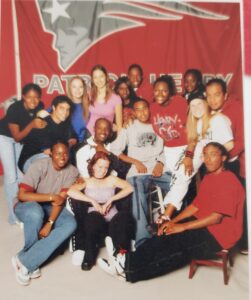

 By Pastor John Hulden
By Pastor John Hulden
 By Bob Hulteen
By Bob Hulteen 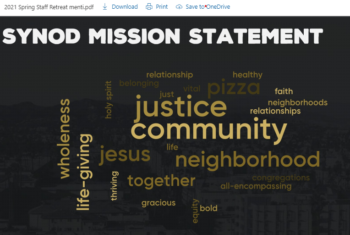
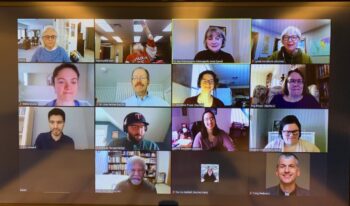
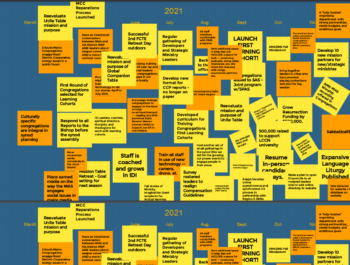

 By Meghan Olsen
By Meghan Olsen 
 By Emilie Bouvier
By Emilie Bouvier 

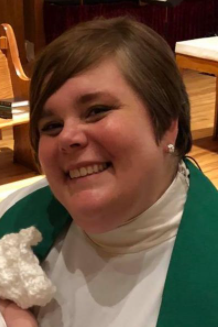
 By Pastor Norma Malfatti
By Pastor Norma Malfatti